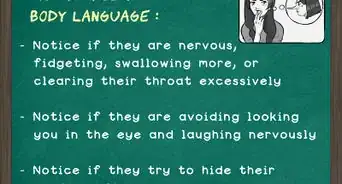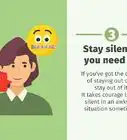This article was co-authored by Christy Irvine, PhD. Dr. Christy Irvine is a Licensed Clinical Psychologist and the owner of her private practice out of Portland, Oregon. With over 10 years of experience, she specializes in individual and couples therapy using various techniques including Emotionally Focused Therapy (EFT), Acceptance and Commitment Therapy (ACT), Interpersonal-Process Therapy, and Cognitive Processing Therapy (CPT). Dr. Irvine holds a B.A. in Psychology from Whitman College and a Ph.D. in Clinical Psychology from The University of Connecticut.
wikiHow marks an article as reader-approved once it receives enough positive feedback. In this case, 100% of readers who voted found the article helpful, earning it our reader-approved status.
This article has been viewed 384,901 times.
Mastering the art of honesty without hurting other people’s feelings means you can effectively communicate and build stronger relationships with those around you. Consider the other person’s feelings and aim to take a friendly, non-threatening approach. Use constructive words, especially if you’re giving advice or asking someone to make a change. Validate how they feel, avoid blame, and keep your judgments to yourself. As you learn to lessen your harshness, people will likely respond better to you and feel less defensive with your feedback.
Steps
Making Your Interactions Positive
-
1Create a clear intent. If you say something mean then follow it up by saying. “I’m just being honest” or, “I’m telling you as a friend” it’s likely you’re disguising your mean comment as honesty. Think about the intent of your comment and whether you’re just saying something to be mean.[1] [2]
- This includes biting comments such as, “I thought you’d never get rid of those jeans!” or, “I’m surprised you ate that considering your weight.”
- As the old saying goes, “If you don’t have anything nice to say, don’t say anything at all.”
-
2Neutralize your emotions. You can say almost anything without coming across harshly as long as you remove yourself emotionally from the situation. This doesn’t mean being cold or stoic while telling someone you don’t love them or that they’re doing terrible work. It means not letting your emotions drive your interaction so that you behave in a mean, angry, or spiteful way.[3]
- For example, if you have a friend who is always late, don’t lash out at them if they are late, yet again. Instead, say, “I woke up early to be ready and meet with you, yet stood here waiting for you for 20 minutes. Please consider my time when we agree to meet.”
- If you need to talk to the person but know that you’re not calm, take some time to neutralize. Give it an hour, a day, or a couple days depending on what you need. Say, “I’m upset now, but I’d like to speak with you about this later so we can better understand each other.”
Advertisement -
3Find the right space and time to talk. Don't tell the person something potentially hurtful or embarrassing in front of other people; speaking to them alone as the best option. If you need to have an honest talk, aim for the right conditions. Choose a place that’s quiet and away from other people and prying ears. Pick a time when you can both talk, not when either of you has to rush off to something else.
- Face-to-face is best; it helps both people read each other’s body language and respond to nonverbal cues.
-
4Make a request, not a demand. Don’t become bossy or demanding in your speech. Maybe you don’t like something someone else does and you want them to stop. Instead of demanding that they change or do something different, make a request instead. Asking instead of telling shows that you’re considering the person’s feelings and not demanding anything of them.
- For example, if someone goes on and on about a subject you’re not interested in, ask them nicely to talk about something else. Say, “I hear what you’re saying. Let’s move onto something else” or, “I understand your opinion and don’t want to talk about this further.”
-
5Aim to be helpful, not hurtful. While the truth might set you free, it might also hurt someone else’s feelings. If you feel like an honest moment is needed, make sure that the honesty is truly helpful. There are times when you need to be honest with someone and the truth might hurt. However, do your best to make it constructive and not destructive.
- Find ways to speak kindly to people and offer to help them. For example, say, “I’ve noticed you’ve lagged on some deadlines. Is there anything I can do to help you to get these tasks done on time?”
- Ask yourself, “Might this hurt the person’s feelings?” or, “Can I say this in a kinder, more constructive way?”
-
6Let them have a choice to discuss the issue. Perhaps you have strong convictions you wish others would see as truth. You might be entirely correct or on higher moral grounds in your ways, but you cannot force an issue onto someone else. If they make it clear they don’t want to discuss it, drop the conversation.
- For example, you might have strong religious values or moral beliefs. If you’re trying to convert someone to your truth, honor their choice to not engage in the discussion, even if you know your words to be true.
- Often, forceful discussions turn people off instead of allowing them to appreciate your perspective.
Being Considerate of the Other Person
-
1Be sensitive to the other person. Don’t make the exchange all about you. Listen to the other person and consider their feelings. If they sound uncomfortable or shocked, tailor your words to be softer or more gentle. Be aware of their communication and how your words are being interpreted.[4]
- Don’t just listen to their words, be attentive to their body language, too. If they are avoiding eye contact, crossing their body, or looking like they want to leave the conversation as soon as possible, consider changing your tone.
-
2Validate their feelings. Be conscious about how the other person feels (or might feel) while you speak to them. However the person acts or responds is valid. If they are offended or upset, understand that it’s okay for them to react, even if you don’t like it. Let them know you understand and are sensitive to their feelings.[5]
- Forget saying “should” as in, “You should try this” or, “You should do this instead.” This invalidates the other person and makes it sound like you’re the expert.
- For example, say, “I can see you’re upset by me saying this, and that’s understandable. I want to bring something to your attention, but I also don’t want to hurt you.”
-
3See the positives, not just the negatives. Maybe you tend to be critical in your approach to life. While this can be a useful skill, it’s often less useful when dealing with people. Don’t focus solely on what you dislike about a person or what they do wrong. Balance your negative thinking with some positive things they do or say. When talking to them about something you don’t like, bring up some things you do like.[6]
- For example, to a flaky friend you can say, “You are such a great friend and I really love hanging out with you, and yet, I also get really frustrated when you cancel last minute.”
-
4Withhold your judgments. Speaking truth doesn’t mean you have free reign to share your judgments with the person. Perhaps you’re unhappy with the decisions they make. Refuse to tell them what they are doing wrong and instead, focus on your concern. Be discerning in what you address and how you address it.[7]
- For example, if you have a friend doing drugs, don’t say, “Drugs are bad for you, I can’t believe you’re doing them.” Instead, say, “I’m concerned about you since you’ve started using drugs. I’ve noticed changes in your behavior and I’m concerned things may not be going well for you.”
Improving Your Skills
-
1Avoid blaming the person. You might be working with someone and be late on a deadline. Instead of blaming someone, find ways to work together instead of trying to find someone to blame. Maybe someone did drop the ball, but if you’re working together, that means finding solutions together.[8] [9]
- If you find yourself saying, “Well, someone had to say it” as a way to express anger toward someone, you’re likely using your honesty as a way to blame others.
-
2Use an approachable tone. There’s a difference in tone of voice when you’re yelling at someone or talking to someone casually. Aim to use a casual tone or professional tone when talking to someone. Harshness can come out through tone, so avoid responding too quickly, using sharp words or speech, or speaking loudly.
- For example, speak softer to avoid sounding aggressive.
-
3Use humor. Maybe a friend has a bad habit that drives you nuts. Don’t lose your cool over it. Instead, add some humor to approach the topic gently. This allows you to say what you need to say but also not make a big deal over it.[10] Humor can also help to diffuse tense or difficult situations.
- Make a small joke or say something silly to get your point across.
-
4Avoid the question, if necessary. Maybe someone asks you a question that makes you uncomfortable in giving an honest response. For example, they might ask, “Do you like my boyfriend?” or, “What do you think of these pants?” While you might want to answer honestly, your response may also hurt the person’s feelings. Aim to be general or respond to something regarding the topic they bring up. This allows you to be honest yet still kind and inoffensive.
- For example, if someone asks if you like their terrible food, say, “This is a unique flavor unlike anything I’ve ever tasted before!” or, “My favorite part of the meal is the potatoes.”
Expert Q&A
-
QuestionHow can I be honest without being hurtful when someone is sensitive?
 Christy Irvine, PhDDr. Christy Irvine is a Licensed Clinical Psychologist and the owner of her private practice out of Portland, Oregon. With over 10 years of experience, she specializes in individual and couples therapy using various techniques including Emotionally Focused Therapy (EFT), Acceptance and Commitment Therapy (ACT), Interpersonal-Process Therapy, and Cognitive Processing Therapy (CPT). Dr. Irvine holds a B.A. in Psychology from Whitman College and a Ph.D. in Clinical Psychology from The University of Connecticut.
Christy Irvine, PhDDr. Christy Irvine is a Licensed Clinical Psychologist and the owner of her private practice out of Portland, Oregon. With over 10 years of experience, she specializes in individual and couples therapy using various techniques including Emotionally Focused Therapy (EFT), Acceptance and Commitment Therapy (ACT), Interpersonal-Process Therapy, and Cognitive Processing Therapy (CPT). Dr. Irvine holds a B.A. in Psychology from Whitman College and a Ph.D. in Clinical Psychology from The University of Connecticut.
Licensed Clinical Psychologist Just make it totally clear before you start speaking that you're going to be honest but that it's only your perspective. Don't present your opinion as fact, and try to frame things as just your opinion.
Just make it totally clear before you start speaking that you're going to be honest but that it's only your perspective. Don't present your opinion as fact, and try to frame things as just your opinion. -
QuestionIs it better to be brutally honest?
 Christy Irvine, PhDDr. Christy Irvine is a Licensed Clinical Psychologist and the owner of her private practice out of Portland, Oregon. With over 10 years of experience, she specializes in individual and couples therapy using various techniques including Emotionally Focused Therapy (EFT), Acceptance and Commitment Therapy (ACT), Interpersonal-Process Therapy, and Cognitive Processing Therapy (CPT). Dr. Irvine holds a B.A. in Psychology from Whitman College and a Ph.D. in Clinical Psychology from The University of Connecticut.
Christy Irvine, PhDDr. Christy Irvine is a Licensed Clinical Psychologist and the owner of her private practice out of Portland, Oregon. With over 10 years of experience, she specializes in individual and couples therapy using various techniques including Emotionally Focused Therapy (EFT), Acceptance and Commitment Therapy (ACT), Interpersonal-Process Therapy, and Cognitive Processing Therapy (CPT). Dr. Irvine holds a B.A. in Psychology from Whitman College and a Ph.D. in Clinical Psychology from The University of Connecticut.
Licensed Clinical Psychologist It totally depends on the utility of your feedback. If you're just giving your friends fashion advice, no, it's probably not a good idea to be brutal. If it's a performance review and you have an employee at risk of losing their job, then totally. They need to hear the truth.
It totally depends on the utility of your feedback. If you're just giving your friends fashion advice, no, it's probably not a good idea to be brutal. If it's a performance review and you have an employee at risk of losing their job, then totally. They need to hear the truth.
References
- ↑ https://www.forbes.com/sites/kathycaprino/2016/02/04/are-you-helpful-or-hurtful-in-your-communications-heres-exactly-how-to-tell/#47e6a79365f7
- ↑ Christy Irvine, PhD. Licensed Clinical Psychologist. Expert Interview. 9 April 2021.
- ↑ https://www.forbes.com/sites/kathycaprino/2016/02/04/are-you-helpful-or-hurtful-in-your-communications-heres-exactly-how-to-tell/#47e6a79365f7
- ↑ Christy Irvine, PhD. Licensed Clinical Psychologist. Expert Interview. 9 April 2021.
- ↑ https://www.psychologytoday.com/blog/pieces-mind/201204/understanding-validation-way-communicate-acceptance
- ↑ http://www.mayoclinic.org/healthy-lifestyle/stress-management/in-depth/positive-thinking/art-20043950?pg=2
- ↑ https://www.psychologytoday.com/blog/sapient-nature/201105/dont-be-judgmental-be-discerning
- ↑ https://www.forbes.com/sites/kathycaprino/2016/02/04/are-you-helpful-or-hurtful-in-your-communications-heres-exactly-how-to-tell/#47e6a79365f7
- ↑ Christy Irvine, PhD. Licensed Clinical Psychologist. Expert Interview. 9 April 2021.
About This Article
With a little extra thought and the right tone of voice, you can be honest with people without sounding harsh. If you want to say something that might come across as a criticism, try leading with a positive statement. For example, say, “I love spending time with you, but do you think you could get here earlier next time?” Always use a calm, casual tone of voice so they won’t think you’re trying to offend them. You can also try disguising your honesty in a joke. For instance, if you don’t like someone’s song, say something like, “It’s not really my thing, but my idea of good music would probably deafen you.” On the other hand, if you think your words might come across harsh and they haven't directly asked you, it might be safer not to say anything. For more tips, including how to validate someone’s feelings, read on!












































































